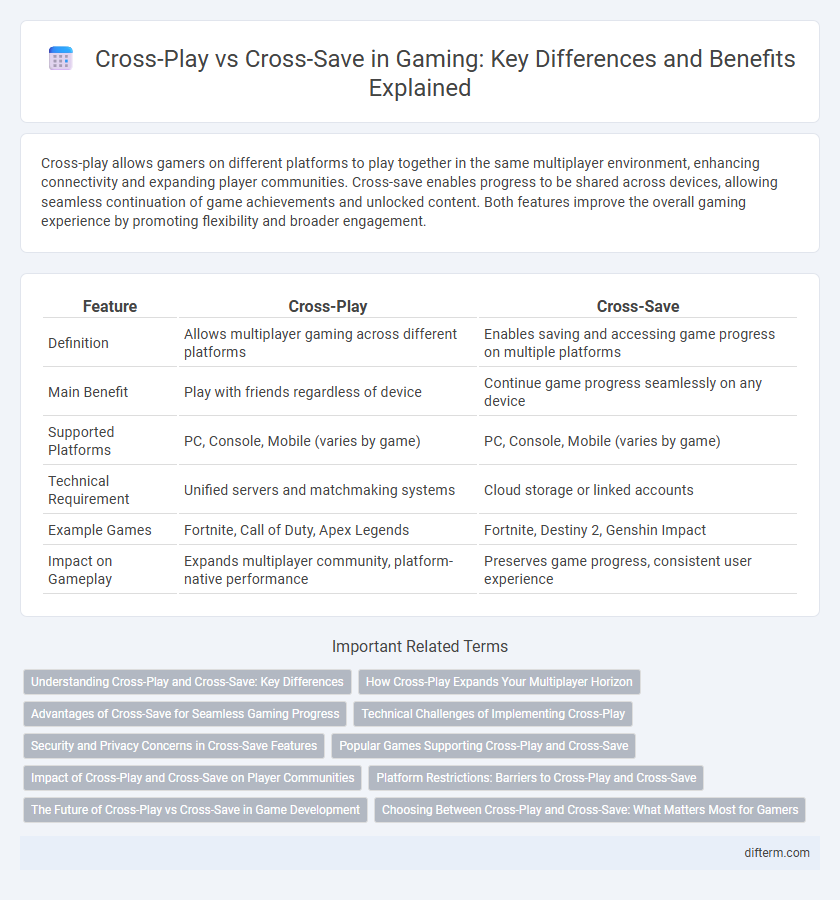Cross-play allows gamers on different platforms to play together in the same multiplayer environment, enhancing connectivity and expanding player communities. Cross-save enables progress to be shared across devices, allowing seamless continuation of game achievements and unlocked content. Both features improve the overall gaming experience by promoting flexibility and broader engagement.
Table of Comparison
| Feature | Cross-Play | Cross-Save |
|---|---|---|
| Definition | Allows multiplayer gaming across different platforms | Enables saving and accessing game progress on multiple platforms |
| Main Benefit | Play with friends regardless of device | Continue game progress seamlessly on any device |
| Supported Platforms | PC, Console, Mobile (varies by game) | PC, Console, Mobile (varies by game) |
| Technical Requirement | Unified servers and matchmaking systems | Cloud storage or linked accounts |
| Example Games | Fortnite, Call of Duty, Apex Legends | Fortnite, Destiny 2, Genshin Impact |
| Impact on Gameplay | Expands multiplayer community, platform-native performance | Preserves game progress, consistent user experience |
Understanding Cross-Play and Cross-Save: Key Differences
Cross-play enables gamers on different platforms like PC, Xbox, and PlayStation to play together in real-time multiplayer sessions, promoting a unified gaming community. Cross-save allows players to transfer and continue their game progress and achievements across multiple devices, ensuring a seamless experience regardless of hardware. While cross-play focuses on multiplayer compatibility between platforms, cross-save centers on synchronizing individual game data across systems.
How Cross-Play Expands Your Multiplayer Horizon
Cross-play enables gamers on different platforms such as Xbox, PlayStation, and PC to compete and cooperate in shared multiplayer sessions, significantly broadening the player base and matchmaking opportunities. This feature enhances real-time interaction and community engagement by breaking down hardware barriers, allowing seamless gameplay across consoles and devices. Cross-play fosters a more diverse and dynamic gaming environment, driving longer game longevity and a richer multiplayer experience.
Advantages of Cross-Save for Seamless Gaming Progress
Cross-save technology allows gamers to maintain continuous progress across multiple platforms, eliminating the need to restart or duplicate achievements. By synchronizing game data in real time, it enhances user convenience and maximizes engagement. This seamless transition fosters a unified gaming experience, boosting player retention and satisfaction.
Technical Challenges of Implementing Cross-Play
Implementing cross-play involves complex network synchronization across diverse hardware architectures and operating systems, requiring robust server infrastructure to handle real-time data exchanges and minimize latency. Developers must tackle challenges in unifying matchmaking systems, preserving gameplay balance, and ensuring secure communication protocols to prevent cheating across platforms. Integrating cross-save further complicates data consistency and cloud synchronization, demanding seamless API interoperability and user authentication across multiple ecosystems.
Security and Privacy Concerns in Cross-Save Features
Cross-save features enable gamers to access their progress across multiple platforms, but they introduce significant security and privacy concerns due to the synchronization of sensitive user data via cloud servers. The risk of data breaches and unauthorized access increases as game progress, personal preferences, and in-game purchases are stored and transmitted between devices. Ensuring robust encryption protocols and strict access controls is critical to protecting user information and maintaining privacy in cross-save implementations.
Popular Games Supporting Cross-Play and Cross-Save
Popular games supporting cross-play and cross-save include titles like Fortnite, Call of Duty: Warzone, and Minecraft, enabling players to join matches across PlayStation, Xbox, and PC platforms seamlessly. These features enhance player retention by allowing progress continuity across devices, as seen in games like Genshin Impact and Apex Legends. Cross-play broadens multiplayer accessibility, while cross-save ensures saved game data synchronization, boosting user engagement in the gaming community.
Impact of Cross-Play and Cross-Save on Player Communities
Cross-play enables players from different platforms to compete or collaborate in the same gaming environment, significantly broadening player communities and enhancing multiplayer experiences by reducing platform barriers. Cross-save allows gamers to maintain progress across devices, fostering a seamless gaming experience and encouraging greater player retention and engagement. Together, these features contribute to more unified and dynamic player communities, supporting increased interaction and long-term game investment.
Platform Restrictions: Barriers to Cross-Play and Cross-Save
Platform restrictions significantly limit cross-play capabilities, as console manufacturers often impose exclusive network ecosystems and security protocols that prevent seamless multiplayer interaction across different devices. Cross-save features face similar barriers, with save data encryption and proprietary cloud storage systems restricting the transfer of game progress between platforms. These limitations hinder a unified gaming experience by fragmenting user bases and complicating cross-platform continuity.
The Future of Cross-Play vs Cross-Save in Game Development
Cross-play technology enables gamers on different platforms to compete and collaborate seamlessly, enhancing multiplayer experiences and broadening user communities. Cross-save functionality allows players to maintain progress across devices, increasing convenience and player retention by enabling uninterrupted gameplay. The future of game development will likely prioritize integrating both cross-play and cross-save features to create cohesive, flexible ecosystems that optimize engagement and accessibility.
Choosing Between Cross-Play and Cross-Save: What Matters Most for Gamers
Choosing between cross-play and cross-save depends on whether multiplayer accessibility or data continuity is more important to gamers. Cross-play enables players to compete with friends across different platforms, enhancing social interaction and matchmaking variety. Cross-save ensures seamless progress transfer between devices, crucial for gamers who switch consoles but prioritize maintaining their game progress and achievements.
cross-play vs cross-save Infographic

 difterm.com
difterm.com